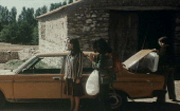Marking Carlos Saura’s first film following the death of Franco in 1975 as Spain emerged from the shadows of fascism towards democracy, Elisa, My Love also represents Saura’s creative transition from allusively political to integrally personal filmmaking, resulting in one of his most intimate, captivating, emotionally lucid, and profoundly introspective works on loneliness, aging, passion, reconciliation, and legacy. The film opens to a curiously apparent disjunction: a male narrator recounts an impulsive decision to embark on a haphazardly arranged trip organized by the family from Madrid to the country upon receiving word of their estranged father’s deteriorating health and compromised recuperation after a recently undergone surgery – a reluctant journey to a distant parent that had only been made palatable by the idea of spending time away from home, and providing a convenient distraction from ongoing marital troubles with a (presumably male) spouse named Antonio. In hindsight, the assignment of the masculine voice – later illustrated to be the father’s, a writer and school teacher named Luis (Fernando Rey) – for what is subsequently revealed to be the unexpressed sentiments of his vulnerable and emotionally fragile daughter, Elisa (Geraldine Chaplin) proves to be an incisive trompe l’oeil (or rather, trompe l’oreille) that prefigures the profound, almost instinctual connection between absent father and lost child. Having left his wife (who, uncoincidentally, bears striking physical resemblance to the now adult Elisa) and the family home when Elisa was still a child (Ana Torrent), Luis has broken from his past – not to embark on a new adventure or in search of something better – but to escape its emotional burden, retiring to the country to lead a humble life of solitude writing his autofictional stories from a rented cabin. Encountering a deeply introspective, unfinished, diaristic manuscript among the work-in-progress papers on her father’s desk, Elisa is immediately drawn to her father’s pensive isolation, and accepts his invitation to spend a few days at the cabin where gradually, past and present, reality and imagination, dream and anxiety converge to give form to Elisa’s ephemeral, unarticulated despair over her parents’ traumatic separation and her own failing marriage. Saura’s perceptive juxtaposition of the dark and cramped cabin against the vast, open fields of the rural landscape (a contrasted visual framing that is also underscored in the bookending long shot of the family automobile traversing the unpaved road that leads to the cabin) proves especially suited to the film’s alternating realms of physical and psychological realities – a paradoxical metaphor that encapsulates Elisa’s emotional and existential limbo (and perhaps, more broadly, an indirect allusion to the state of post-Franco Spain itself) between captivity and liberation, terminality and perpetuity, death and transfiguration.
© Acquarello 2007. All rights reserved.
